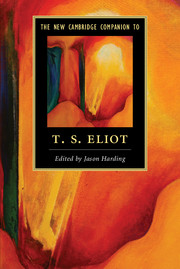Book contents
- Frontmatter
- Contents
- Notes on contributors
- Preface
- Chronology of Eliot's life and works
- List of abbreviations
- 1 Unravelling Eliot
- 2 Eliot: Form and Allusion
- 3 Prufrock and Other Observations
- 4 Banishing the Backward Devils: Eliot's Quatrain Poems and “Gerontion”
- 5 With Automatic Hand: The Waste Land
- 6 “Let These Words Answer”: Ash-Wednesday and the Ariel Poems
- 7 Four Quartets
- 8 “A Precise Way of Thinking and Feeling”: Eliot and Verse Drama 116
- 9 T. S. Eliot as Literary Critic
- 10 T. S. Eliot's Social Criticism
- 11 Gender and Sexuality
- 12 Eliot's Philosophical Studies: Bergson, Frazer, Bradley
- 13 “Anglo-Catholic in Religion”: T. S. Eliot and Christianity
- Select bibliography
- Index
- Miscellaneous Endmatter
2 - Eliot: Form and Allusion
Published online by Cambridge University Press: 01 December 2016
- Frontmatter
- Contents
- Notes on contributors
- Preface
- Chronology of Eliot's life and works
- List of abbreviations
- 1 Unravelling Eliot
- 2 Eliot: Form and Allusion
- 3 Prufrock and Other Observations
- 4 Banishing the Backward Devils: Eliot's Quatrain Poems and “Gerontion”
- 5 With Automatic Hand: The Waste Land
- 6 “Let These Words Answer”: Ash-Wednesday and the Ariel Poems
- 7 Four Quartets
- 8 “A Precise Way of Thinking and Feeling”: Eliot and Verse Drama 116
- 9 T. S. Eliot as Literary Critic
- 10 T. S. Eliot's Social Criticism
- 11 Gender and Sexuality
- 12 Eliot's Philosophical Studies: Bergson, Frazer, Bradley
- 13 “Anglo-Catholic in Religion”: T. S. Eliot and Christianity
- Select bibliography
- Index
- Miscellaneous Endmatter
Summary
James Longenbach has argued that “Eliot forces his readers to feel the weight of his allusions very strongly.” The point is thought-provoking; forcing us to “feel the weight of … allusions” is part of that process of “assuming a double part” which Gareth Reeves notes is acknowledged as “an articulated and articulate strategy” in the terza rima passage in Little Gidding. In Eliot, allusion brings to mind a particular literary moment and a larger generic model. At the same time allusion finds a home in an imaginative world that is innovative.
This newness may often involve shaking us out of conventional responses, as when, in John Crowe Ransom's words, Eliot “inserts beautiful quotations into ugly contexts.” Ransom is discussing the use of Olivia's song from Goldsmith's The Vicar of Wakefield (1766) in The Waste Land. Here, Eliot turns lyric melancholy into a simulacrum of automatic response. He does so by making us hear the original differently. That original (“When lovely woman stoops to folly”) has a tetrametric lilt and movement that are called up yet almost cancelled through the addition of “and” in line 253, “an unaccented syllable,” as Jason Harding points out. The reworking satirises lyric sentimentality. But it stops short of mere debunking; Eliot/Tiresias may have “foresuffered all” (CPP 69), yet there is something to be “suffered” in the scene, and the allusion suggests that there is, as well, residual value in the original lyric mode.
That value allows Eliot to express tacit sadness at the fate of the woman who “smoothes her hair with automatic hand, / And puts a record on the gramophone” (CPP 69). The quatrains of the passage's central section imitate the “automatic” nature of the sexual encounter they depict. The formal means are metronomic iambs and alternating, often sardonic rhymes: “guesses” and “caresses,” “tired” and “undesired” (CPP 68). However, as a whole, the passage accommodates disciplined feelings of yearning. Secret sympathy for the woman insinuates itself beneath the air of detachment. Her washing “perilously spread,” she is a descendant of the Keats who imagines voyages across “perilous seas, in fairy lands forlorn” (“Ode to a Nightingale,” line 70).
- Type
- Chapter
- Information
- The New Cambridge Companion to T. S. Eliot , pp. 26 - 40Publisher: Cambridge University PressPrint publication year: 2016



